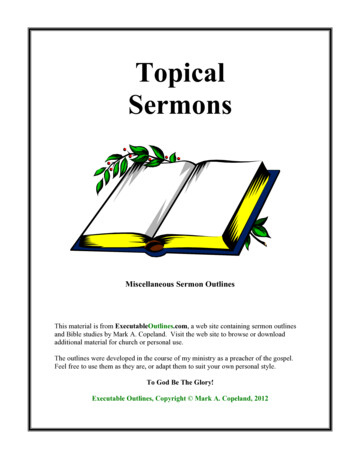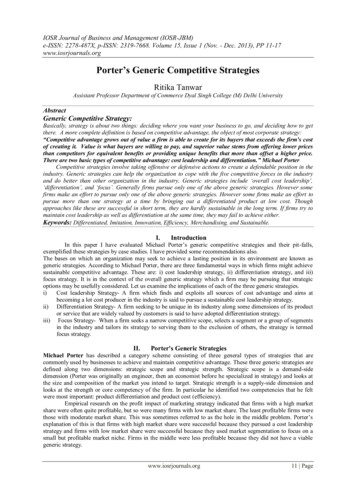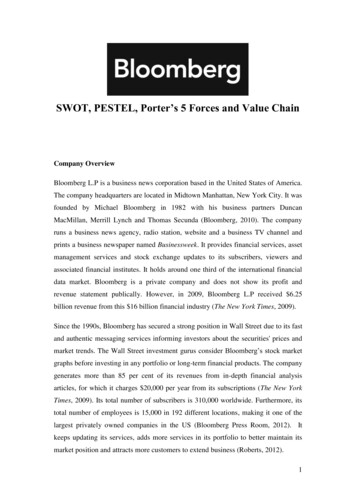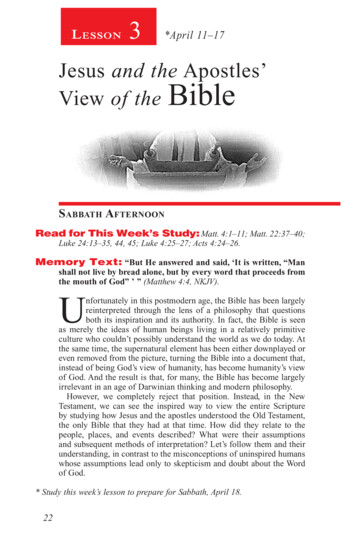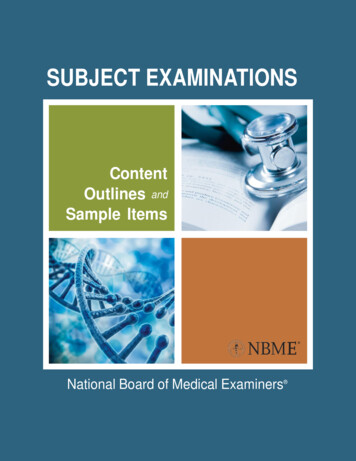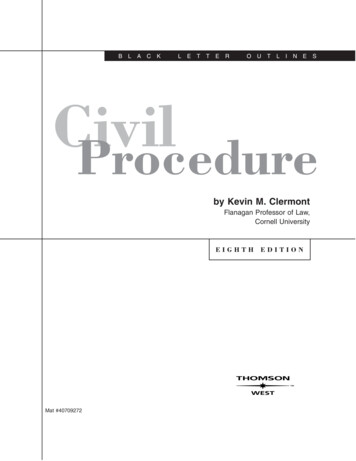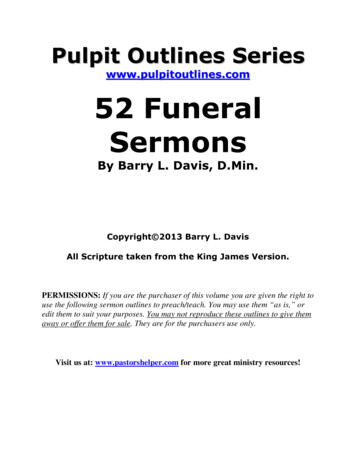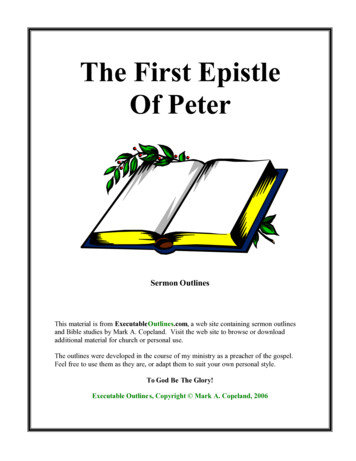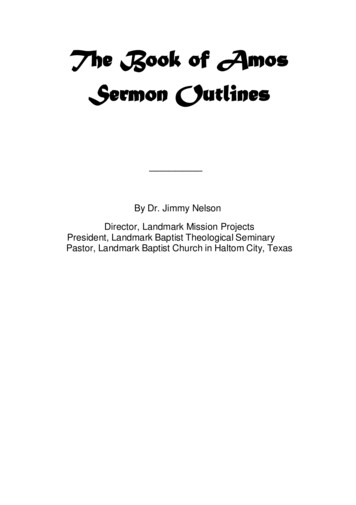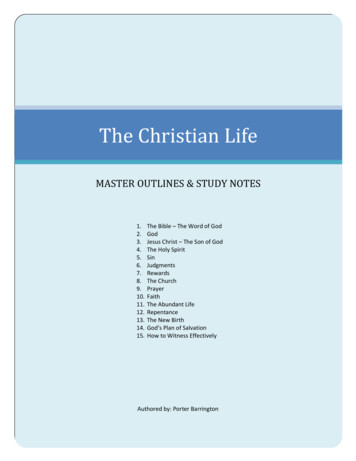
Transcription
The Christian LifeMASTER OUTLINES & STUDY NOTES1.2.3.4.5.6.7.8.9.10.11.12.13.14.15.The Bible – The Word of GodGodJesus Christ – The Son of GodThe Holy SpiritSinJudgmentsRewardsThe ChurchPrayerFaithThe Abundant LifeRepentanceThe New BirthGod’s Plan of SalvationHow to Witness EffectivelyAuthored by: Porter Barrington
Bible Study OutlinesThese Bible studies are based on:The Christian Life————MASTER OUTLINES & STUDY NOTESCompiled by Porter BarringtonNKJVThis work is published in conjunction with The Holy Bible, New King James Version –Copyright 1982 by Thomas Nelson, Inc.FORWARDThe Bible is the most important book ever written. It is God’s written Word to man. TheNew Testament tells about the Lord Jesus Christ, Himself. It tells of His birth, His death,and His resurrection.These outlines have been put together by Porter Barrington, who has been an evangelisticpastor all of his adult life. The Word of God has been at the heart of his entire ministry.The Christian Life Study Outlines and Notes are the amplification of a ministry of over 35years, both in the pastorate and in the field of teaching and evangelism. These lessons byPorter Barrington on the Great Doctrines of the Bible are simple without being ordinary, short withoutbeing shallow, brief without being dwarfed, positive without being over-formal and comprehensivewithout being complicated.They were produced to fill a need in the life of the average Christian, to provide an incentiveto know more of God’s Holy Word. If diligently studied, they will help to establish you in the faithand give you spiritual confidence.It is suggested that you study the Master Outlines in the order given; one each day for fifteendays, and at the end of fifteen days, you will know more about the New Testament than you everthought possible. This study is equal to an advanced course in Systematic Theology. If you reviewthese lessons often, you will continue to grow in the knowledge of our Lord and Savior Jesus Christ.
Outline One: The BibleThe Bible is The Word of GodIt is important for a new or renewed Christian to start right; therefore, the firstlesson is designed to help establish your faith in the Bible, for it IS the word ofGod. Keep in mind that the Bible is not a book of philosophy, although it is philosophical. Donot go to the Bible for a scientific argument. However, there is no discrepancy betweenascertained facts of science and the Bible. The Bible is not a book of history, but is found tobe accurate when recording history. The Bible was given to us from God, revealing JesusChrist, the Son of God, and God the Son, the only Savior John 14:6. He is the center andthe circumference. It is Christ from Genesis to Revelation John 5:39.The Bible is as high above all other books as the heavens are above theearth. Someone has said of the Bible: “Read it to be wise, believe it to be safe and practiceit to be right.”1The Bible claims to be the inspired word of God – (II Timothy 3:16-17): 16) “AllScripture is given by inspiration of God, and is profitable for doctrine, reproof, forcorrection, for instruction in righteousness, 17) that the man of God may be complete,thoroughly equipped for every good work.”Note:“All scripture is given by inspiration of God.” Upon this statement of fact,evangelical Christianity stands. The Bible claims to be the inspired Word of God. By“inspiration” we mean that the Holy Spirit exerted His supernatural influence upon thewriters of the Bible. The writings were inspired – not necessarily the writers, for theBible nowhere claims to have been written by inspired men.1) The Holy Spirit is the author of the Bible (II Peter 1:21). Christ told His disciplesthat he would leave “many things’ unrevealed, and that the Holy Spirit would comeand choose certain persons and through them reveal His perfect will unto man; andthat the Holy Spirit would be the believer’s teacher (John 16:12-15).2) Man is the instrument used by the Holy Spirit to write the Bible3) Results: the infallible Word of God. Therefore, the Bible is free from error andabsolutely trustworthy. (Psalm 119:89 and Matthew 24:35)2The Bible is a difficult book (I Corinthians 2:14-16): 14) “But the natural man doesnot receive the things of the Spirit of God, for they are foolishness to him; nor can he
know them, because they are spiritually discerned. 15) But he who is spiritual judges allthings, yet he himself is rightly judged by no one. 16) For “who has known the mind ofthe Lord that he may instruct Him?” But we have the mind of Christ.”Notes:The Bible is a difficult book because it came from the infinite to the finite –from the unlimited, all powerful God, to limited man. Therefore, you cannotunderstand the Bible as you would understand the writings of Plato or Socrates. You canstudy the great philosophers with the natural mind, and by diligent application, grasptheir profound meanings. If the Bible could be understood by natural man, it would be anatural book and could not be the Word of God. Since the Bible is from God, andtherefore spiritual, before you can receive its teachings, you must be born of the SpiritJohn 3:6 and filled with the Spirit Ephesians 5:18. Always approach the Bible prayingthat the Spirit will be your teacher and will guide you to a better understanding of HisHoly Word, or it will remain a difficult, closed book (John 16:12-15).3The Bible is a book of oneness (2 Peter 1:21): 21) “for prophecy never came by thewill of man, but holy men of God spoke as they were moved by the Holy Spirit.”Notes:The oneness or unity of the Bible is a miracle. It is a library of 66 books, written byover 35 different authors, in a period of approximately 1,500 years. Represented in theauthors is a cross section of humanity, educated and uneducated, including kings,fishermen, public officials, farmers, teachers and physicians. Included in the subjects arereligion, history, law, science, poetry, drama, biography and prophecy. Yet its variousparts are as harmoniously united as the parts that make up the human body.For 35 authors, with such varied backgrounds, to write on so many subjects,over a period of approximately 1,500 years, in absolute harmony, is amathematical impossibility. It could not happen! Then how do we account for theBible? The only adequate explanation is: “Holy men of God spoke as they were movedby the Holy Spirit.”4The Bible claims special power (Hebrews 4:12): 12) “For the word of God is livingand powerful, and sharper than any two-edged sword, piercing even to the division ofsoul and spirit, and of joints and marrow, and is discerner of the thoughts and intents ofthe heart.”
Notes:“For the word of God is living and powerful ” The Bible claims:1) Dividing power as a sword (above verse). The Bible will separate man from sinII Psalm 119:11 or sin will separate man form the Bible Isaiah 59:22) Reflecting power as a mirror James 1:22-25. In the Bible, we see ourselves asGod sees us – as sinners Romans 3:233) Cleansing power as water Ephesians 5:26. David prayed that God would “washhim from iniquity” and “cleanse him from sin.” Psalm 51:24) Reproductive power as seed 1 Peter 1:23. We are children of God because wehave been born into the family of God by the incorruptible seed of God. This is thenew birth John 3:1-75) Nourishing power as food 1Peter 2:2. The Bible is spiritual food for the soul. NoChristian can remain strong in the Lord and not study the Word of God5The Bible commands the believer to study the scriptures (2 Timothy 2:15)15) “Be diligent to present yourself approved to God, a worker who does not need to beashamed, rightly dividing the word of truth.”Notes:“Study to show thyself approved unto God” is a command. As you study the Bible,you will discover that it does not just contain the Word of God – it IS the Word of God.You must also keep in mind that the Word of God contains the words of God, as well asthe words of Satan, demons, angels and man – both good and bad. God is truth andcannot lie. Satan “is a liar and the father of it” John 8:44. Man is natural and is thereforelimited, and does not always speak the truth. To illustrate: Matthew 22:15-46. In thisportion of Scripture, we have the words of Jesus, of the Pharisees, of the Herodians andof the Sadducees. The Pharisees, Herodians and Sadducees were trying to entangleJesus in His teachings, that they might accuse Him of breaking God’s law. Their wordswere spoken with evil intent, revealing the thinking of the natural man, along with thewords of God that came from the lips of Jesus.As you study the Bible, ask yourself these questions:1) Who is speaking: God, demon, angel or man?2) To whom is he speaking: to the nation Israel, to the Gentiles, to the Church, to menin general or to some individual man or being?3) How can this Scripture be applied to my own life to make me a better Christian?
Outline Two: GodThe Bible reveals God as the only infinite and Eternal Being, having no beginningand no ending. He is the Supreme Personal Intelligence, and Righteous Ruler of Hisuniverse. He is life, and therefore, the only source of life (John 5:26).Man is natural and cannot know God by wisdom (Job 11:7). God is a person and canbe known only by revelation. In the Old Testament He revealed Himself to and through Hisprophets? In the New Testament He reveals Himself through Jesus Christ (Hebrews 1:1-3)1The existence of God (Hebrews 11:6): 6) But without faith it is impossible to pleaseHim, for he who comes to God must believe that He is, and that He is a rewarder ofthose who diligently seek Him.Notes:The Bible nowhere attempts to prove or argue the existence of God. “For hethat comes to God must believe that he is.”The existence of God as a fact taken for granted by the writers of both the Oldand New Testaments. “In the beginning God” (Genesis 1:1). The Bible opens byannouncing the sublime fact of God and His existence. There are arguments for theexistence of God; they are not conclusive but are food for thought:1) Universal belief in God comes from within man. It is innate in man, and comesfrom rational intuition.2) The argument from “cause and effect.” Everything that began owes its existenceto a cause. We have a watch; we must have a watchmaker. We have a building; wemust have a builder. We have creation; we must have a creator. This creation couldnot have come into existence without an intelligent, personal creator, any more thanthe alphabet could produce a book without an author.3) The argument from anthropology. Man’s moral and intellectual nature argues fora moral and intellectual creator.4) The Bible and the Christ that it reveals; His virgin birth, His sinless life, Hisvicarious death and His bodily resurrection – all of this and much, much more –argue for the existence of God.
2The Personality of God (1 Thess. 9) 9) For they themselves declare concerning uswhat manner of entry we had to you, and how you turned to God from idols to serve theliving and true God,Notes:The Bible reveals God as personality. He is called “the living and true God” – Onepossessing self-consciousness and self-determination. His personality is shown in whatHe does, such as:1) God loves. “God so loved the world” (John 3:16)2) God hates. “These six things the Lord hates” (Prov. 6:16 OT)3) God cares. “He cares for you” (1 Peter 5:7)4) God grieves. “He was grieved in His heart” (Gen. 6:6 OT)Only a personality can love, hate, care and grieve; therefore God must be a living,eternal and personal being.3The Nature of God (I John 4:8): 8) He who does not love does not know God, for Godis love.Notes:God is described 4 ways in the Bible. Since God cannot be defined, they areincomplete. However, they do throw light upon the nature of God. They are:1) “God is love” (I John 4:8). This is the nature of God in His divine compassion.2) “God is light” (1 John 1:5). The nature of God’s divine character; there is nodarkness in Him.3) “God is consuming fire” (Hebrews 12:29). This is the nature of God in His divineholiness.4) “God is a Spirit” (John 4:24). This is the nature of God in His divine essence.The attributes of God reveal His nature. Do not think of His attributes as abstract,but as vital mediums through which His holy nature in unveiled – attributes ascribed toHim, such as:1) Life is ascribed to God (John 5:26).2) All knowledge is ascribed to God (Psalm 147:5).3) All power is ascribed to God (Revelation 19:6).4) Filling the universe with His presence is ascribed to God (Psalm 139:7-10).
God is everywhere but not in everything. If God were in everything, man could worshipany object and he would be worshipping God. God is spirit. (John 4:24)4The Grace of God (Eph. 2:8) For by grace you have been saved through faith, and thatnot of yourselves, it is the gift of God,Notes:Grace is the love and mercy of God in action. Mercy is negative, and love ispositive; both together mean grace. To show mercy in love is grace. God showedmercy in love when He sent His Son to bear our sins in His own body on the cross (John3:16).1) The grace of God saves forever (Romans 8:38, 39).2) The grace of God is unconditional; that is, we are not saved if we “hold outunto the end”, or “fail not” or “do our best.” We are saved by the grace of God, apartfrom works (Ephesians 2:8, 9).3) The grace of God is sufficient (2 Corinthians 12:9).4) The grace of God makes no discrimination (Revelation 22:17).5) The grace of God justifies (Romans 3:23, 24).6) The grace of God makes every believer an heir (Titus 3:7).7) The grace of God teaches the believer how to live (Titus 2:11, 12).The grace of God is nothing less than the unlimited love of God expressed inthe gift of His Son, our Savior. It is the undeserved love of God toward sinners.5The Trinity of God (Matthew 3:16, 17): 16) “When He had been baptized, Jesus cameup immediately from the water; and behold, the heavens were opened to Him, and Hesaw the Spirit of God descending like a dove and alighting upon Him. 17) And suddenlya voice came from heaven, saying “This is My beloved Son, in whom I am well pleased.”Notes:By the Trinity of God we mean His tri-personal existence as Father, Son, andHoly Spirit – three distinct persons in one God.1) The Father is recognized as God (1 Peter 1:2) and is all the fullness of theGodhead (John 1:18).2) The Son is recognized as God (Hebrews 1:8 – and is all the fullness of theGodhead in the flesh (John 1:14).
3) The Holy Spirit is recognized as God (Acts 5:3,4) and is all the fullness of theGodhead acting upon man, convicting him of sin (John 16:7-11) and guiding thebeliever into all truth (John 16:12-15).4) The doctrine of the Trinity is not explained in the Old Testament, but israther implied, (Genesis 1:26).5) The doctrine of the Trinity is revealed in the New Testament. In verses 16and 17, we have Christ being baptized in water, the Father speaking from heaven,and the Holy Spirit descending as a dove. We are to baptize in the “name (notnames) of the Father, and of the Son, and of the Holy Spirit” (Matthew 28:19).Even creation implies the doctrine of the Trinity.1) In creation, we have space, matter, and time in one creation.2) In space, we have length, width, and height in one space.3) In matter, we have energy, motion, and phenomenon in one substance.4) In time, we have past, present, and future in one time.5) In man, we have body, soul, and spirit in one man (1 Thessalonians 5:23).6) In the Holy Trinity, we have Father, Son, and Holy Spirit in one God.
Outline Three: Jesus ChristChristianity is unlike any other religion, because it is more than a religion–it is thestory of the life of the Son of God. Christ is Christianity and Christianity is Christ. He isthe main subject of each book of the New Testament, and fulfills all the promises of God inthe Old Testament. From His incarnation to His Second Coming (Revelation 17:14), He isthe God-man, Christ Jesus in glory, exalted above all creatures, having “all power in heavenand in earth”. Matthew 28:18During His earthly ministry, He claimed to be God in human flesh. He is what Heclaimed, or He is not. (Revelation 1:8). Before His claim can be denied, there are somethings that must be accounted for:1 His virgin birth His holy, sinless life His many miracles His vicarious (on our behalf; substitutionary) death His bodily resurrectionThe Deity of Jesus Christ (John 1:1) 1) In the beginning was the Word, and the Wordwas with God, and the Word was God.Notes:The deity of Jesus Christ, or His God nature, is established in the NewTestament. Some of the facts are:1) He is called God by the apostle John (John 1:1)2) He is called God by the apostle Thomas (John 20:28).3) He is called God by God the Father (Hebrews 1:8).4) He claimed to be God in that He was with the Father before creation (John 17:5)5) He claimed to be God in that He was before Abraham. Abraham rejoiced tosee My day ” (John 8:51-59)6) He received worship, and only God is to be worshipped (Matthew 14:33).Angels refused worship (Revelations 22:8, 9). Man refused worship (Acts 10:25, 26)7) He forgives sin (Mark 2:5-11). Only God can forgive sin.8) He is creator and maker of all things (Colossians 1:16)
9) He is Sustainer of all things (Hebrews 1:3). Only God can control the universe.10) He claimed to have “all authority in heaven and on earth” (Matt. 28:18).11) He walked upon the blue waters of Galilee, commanded the winds and thewaves, healed the sick, raised the dead, gave sight to the blind, hearing to the deaf,cast out demons, made the lame to walk, turned water into wine, and fed fivethousand with the lunch of a lad2The Humanity of Jesus Christ (Romans 1:3) 3)“concerning His Son Jesus Christ ourLord, who was born of the seed of David according to the flesh,”Notes:The Humanity of Jesus Christ is seen in His human parentage (Matthew 2:11)1)He developed as a normal human being (Luke 2:52)2)He was subject to all the sinless infirmities of the human nature: He hungered (Matthew 4:2) He was thirsty (John 19:28). He was weary (John 4:6) He wept (John 11:35) He was tempted (Hebrews 4:15)Jesus is man, and yet He is more than man. He is not God and man, but the Godman. He is God in human flesh. His two natures are put together in such a way that thetwo natures become united in one person, having a single consciousness and will.3The Virgin Birth of Jesus Christ (Luke 1:26-35) 26) Now in the sixth month theangel Gabriel was sent by God to a city of Galilee named Nazareth, 27) to a virginbetrothed to a man whose name was Joseph, of the house of David. The virgin’s namewas Mary. 28) And having come in, the angel said to her, “Rejoice, highly favored one,the Lord is with you; blessed are you among women!” 29) But when she saw him, shewas troubled at his saying, and considered what manner of greeting this was. 30) Thenthe angel said to her, “Do not be afraid, Mary, for you have found favor with God. 31)“And behold, you will conceive in your womb and bring forth a Son, and shall call Hisname Jesus. 32) “He will be great, and will be called the Son of the Highest; and theLord God will give Him the throne of His father David. 33) “And He will reign over thehouse of Jacob forever, and of His kingdom there will be no end.” 34) “Then Mary saidto the angel “How can this be, since I do not know a man?” 35) “And the angelanswered and said to her, “The Holy Spirit will come upon you, and the power of the
Highest will overshadow you; therefore, also, that Holy One who is to be born will becalled the Son of God.Notes:The virgin birth of Jesus Christ is without duplicate in history. It was by virginbirth that God became man, one person but two natures: God nature and the nature ofman-man without sin (Hebrews 4:15). The union of the two natures became the Godman Christ Jesus.1) The first hint of the virgin birth is found in (Genesis 3:15). The One todefeat Satan was to be born of “the seed” of the woman. This is a biologicalmiracle: there is no “seed” of the woman. From this, we are to understand thatOne was to be born of a woman without a human father (Luke 1:34, 35)2) Isaiah prophesied of the coming Christ (Isaiah 7:14).3) Isaiah prophesied of Christ (Isaiah 9:6, 7). This means that God gave His onlybegotten Son who was with Him from eternity, and the Child Jesus was born of avirgin. God gave His Son “unto us.”4) According to prophecy, He was to be born in Bethlehem (Micah 5:2)4The Death of Jesus Christ (Philippians 2:8).And being found in the appearance asa man, He humbled Himself and became obedient to the point of death, even the deathof the cross.Notes:The death of Jesus Christ is mentioned more than 120 times in the NewTestament and is spoken of many times by the prophets in the Old Testament.1) The death of Jesus Christ was Vicarious (Matthew 20:28). He was God’ssubstitute for sinners (2 Corinthians 5:21). On the cross, Christ was made sin forthe sinner, the sinner is made righteous.2) The death of Jesus Christ was natural (John 19:31-37). By a natural death,we mean that His spirit and soul were separated from His body.3) The death of Jesus Christ was unnatural (Romans 6:23). By an unnaturaldeath, we mean that since He was sinless, in that He “committed no sin” (1 Peter 2:22)a)“had no sin” (1 John 3:5)b)“knew no sin” (2 Corinthians 5:21)c)before He could die, He had to be “made sin for us.” Therefore, His deathwas unnatural.
4) The death of Jesus Christ was preternatural (Revelation 13:8). By this, wemean that the death of Jesus was not an afterthought with God; it was theforethought of God.5) The death of Jesus Christ was supernatural (John 10:17, 18). Jesus said,“No one takes life from me.” Then He said, “I lay it down of Myself”. “I havepower to take it up again.” This He did on the cross, after three days and threenights, He took life up again when He arose from the dead.Only God in the form of man could die a vicarious, natural, unnatural,preternatural, and supernatural death.5The Resurrection of Jesus Christ (Matthew 28:1-20): 1) Now after the Sabbath, asthe first day of the week began to dawn, Mary Magdalene and the other Mary came tosee the tomb. 2) And behold, there was a great earthquake; for an angel of the Lorddescended from heaven, and came and rolled back the stone from the door, and sat onit. 3) His countenance was like lightning and his clothing as white as snow. 4) And theguards shook for fear of him, and became as dead men. 5) But the angel answeredand said to the women, “Do not be afraid, for I know that you seek Jesus who wascrucified. 6) “He is not here; for He is raised, as He said. Come; see the place wherethe Lord lay. 7) “And go quickly and tell His disciples that He is risen from the dead,and indeed He is going before you into Galilee; there you will see Him. Behold, I havetold you.” 8) So they went out quickly from the tomb with fear and great joy, and ranto bring His disciples word. 9) And as they went to tell His disciples, behold, Jesus metthem, saying, “Rejoice!” So they came and held Him by the feet and worshipedHim. 10) Then Jesus said to them, “Do not be afraid, Go and tell My brethren to go toGalilee, and there they will see Me.” 11) Now while they were going, behold, some ofthe guards came into the city and reported to the chief priests all the things that hadhappened. 12) When they had assembled with the elders and consulted together, theygave a large sum of money to the soldiers. 13) saying, “Tell them, ‘His disciples cameat night and stole Him away while we slept.’ 14) “And if this comes to the governor’sears, we will appease him and make you secure.” 15) So they took the money and didas they were instructed; and this saying is commonly reported among the Jews until thisday. 16) Then the eleven disciples went away into Galilee, to the mountain which Jesushad appointed for them. 17) When they saw Him, they worshiped Him; but somedoubted. 18) And Jesus came and spoke to them, saying, “All authority has been givento Me in heaven and on earth. 19) “Go therefore and make disciples of all the nations,baptizing them in the name of the Father, and of the Son, and of the Holy
Spirit, 20) “teaching them to observe all things that I have commanded you; and lo, Iam with you always, even to the end of the age.” Amen.Notes:Jesus said, “I am the resurrection and the life” (John 11:25). The resurrection ofJesus Christ was the doctrine of the disciples, the faith of the true believer, the courageof the martyr, the theme of every sermon, and the power of every evangelist.Luke tells us that we have “many infallible proofs” of His resurrection (Acts1:3). Let us look at some of these “infallible proofs”.1)After His resurrection He appeared first to Mary Magdalene (John 20:11-18)2)He appeared to the women returning from the tomb (Matthew 28:5-10)3)Then He appeared to Peter (Luke 24:34)4)To the Emmaus disciples (Luke 24:13-31)5)To the apostles, Thomas not present (Luke 24:36-43)6)Again to the apostles, Thomas present (John 20:24-29)7)To the seven by the Sea of Tiberius (John 21:1-23)8)To over five hundred brethren (1 Corinthians 15:6)9)He was seen of James (1 Corinthians 15:7)10) He was seen again by the eleven apostles (Matthew 28:16-20; Acts 1:3-12)11) He was seen of Stephen, the first martyr (Acts 7:55)12) He was seen of Paul on his way to Damascus (Acts 9:3-6; I Corinthians 15:8)Many of these eye witnesses died martyr’s deaths because they preached theresurrection of Jesus Christ. They were glad to die for a living Christ. They had the“infallible proofs.”When Jesus was arrested in the Garden of Gethsemane, all of His disciples“forsook Him and fled” (Matthew 26:56). From this time until after His resurrection,the disciples lived in fear. They did not believe that He would rise from the dead (John20:9). Without the Resurrection, the cross would have been the end of Christianity. Afterthe death of Jesus, we see His disciples dejected, discouraged, and defeated. The deathof Jesus meant the end. How do we account for the great change that came into theirlives three days and three nights later? The only logical explanation is that they had the“infallible proofs” that He had risen from the dead, and was alive forevermore. They sawHim, talked with Him touched Him, and ate with Him.
Now look at some “infallible proofs” according to circumstantial evidence:1) The change that came into the lives of the disciples after the Resurrectionfrom fear to unlimited courage. They rejoiced in persecution (Acts 5:40-42)2) The early church began to worship on the first day of the week, the day ofthe Resurrection. It was not a law-it was spontaneous (Acts 20:7). For almosttwo thousand years, the church has worshipped on the first day. For the Christian,every Sunday is Easter3) surrection (Acts 8:1-4)4) The empty tomb – for if Jesus is not alive, what happened to His body? TheRoman guards were paid to say, “His disciples came at night, and stole Him awaywhile we slept” (Matthew 28:12-13).First, if they stole His body, then how do you account for the fact that they allsuffered, and most of them died martyrs’ deaths? Would not one of them revealthe hiding place to save his own life?Second, no one was ever arrested or tried for stealing the body of Jesus. It isevident that the governing officials did not believe the story of the guards.Third, the guards could have been put to death for sleeping while on watch.Fourth, if they were asleep, how could they known who “stole” the body?Fifth, had the enemies of Jesus moved the body, they could have produced it andended Christianity!!5) The linen clothes found in the empty tomb are proof of the Resurrection (John20:1-10). Had anyone stolen the body, they would not have removed the linenclothes from a three day old dead body. When John saw the linen clothes, he knewthat a miracle had taken place. Jesus came out of the clothes, and they collapsedwithout disturbing the folds. They were left in the empty tomb; and when John sawand believed that Jesus had risen from the dead.6The Ascension and Second Coming of Jesus Christ (Acts 1:9-11): 9) Now whenHe had spoken these things, while they watched, He was taken up, and a cloud receivedHim out of sight. 10) And while they looked steadfastly toward heaven as He went up,behold, two men stood by them in white apparel, 11) who also said, “Men of Galilee,why do you stand gazing up into heaven? This same Jesus, who was taken up from youinto heaven, will so come in like manner as you saw Him go up into Heaven.”
Notes:After forty days of instructing His disciples, the risen Christ ascended up onhigh and is seated at the right hand of the Father (Hebrews 10:12). Two menbrought the message of His second coming to the apostles (Acts 1:11). The message ofthe second coming of Jesus is so important, that it is mentioned over 300 times in theNew Testament.1) He is coming to take His church to be with Him (1 Thessalonians 4:16-17;John 14:1-6)2) He is coming to judge the nations (Matthew 25:31-46)3) He is coming to save Israel (Romans 11:25, 26)4) He is coming to sit upon the throne of David (Luke 1:31-33; Isaiah 9:6, 7)5) He is coming to bring righteous government to this earth again, “Even so,come, Lord Jesus” (Revelation 22:20)
Outline Four: The Holy SpiritThe Holy Spirit is God, and is equal to the Father and the Son. He is God the HolySpirit, and is distinct from the Father and the Son. In the Genesis account of creation, He isseen actively engaged in the work of creation, along with the Father and the Son. In the OldTestament, He empowered men for service; but, when they were disobedient, He departed from them.When David sinned, he prayed, “and do not take Your Holy Spirit from me” (Psalm 51:11).In the New Testament, we see the Holy Spirit indwelling the believer, never leaving, fillingand empowering him. A scriptural understanding of God the Holy Spirit will make you abetter Christian and servant of God.1The Deity of the Holy Spirit (Acts 5:3-4)
new birth John 3:1-7 5) Nourishing power as food 1Peter 2:2. The Bible is spiritual food for the soul. No Christian can remain strong in the Lord and not study the Word of God 5 The Bible commands the believer to study the scriptures (2 Timothy 2:15) 15) “Be diligent to present y

